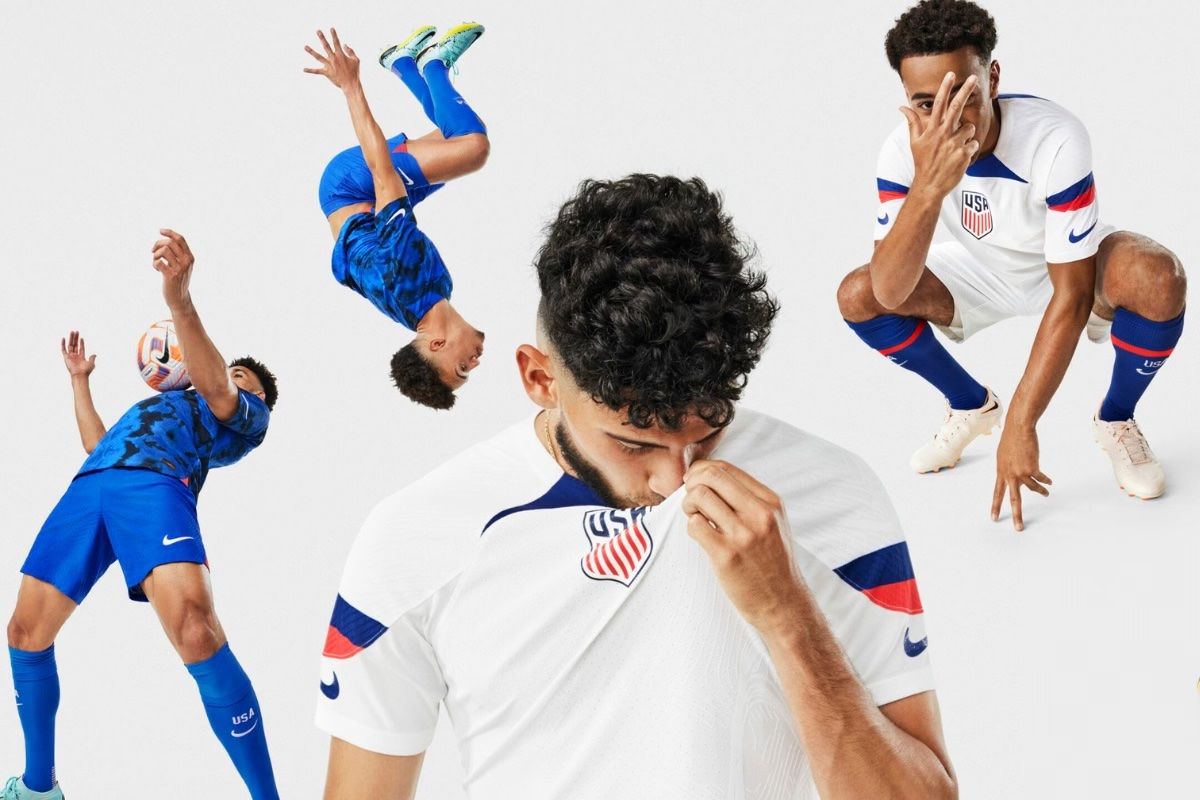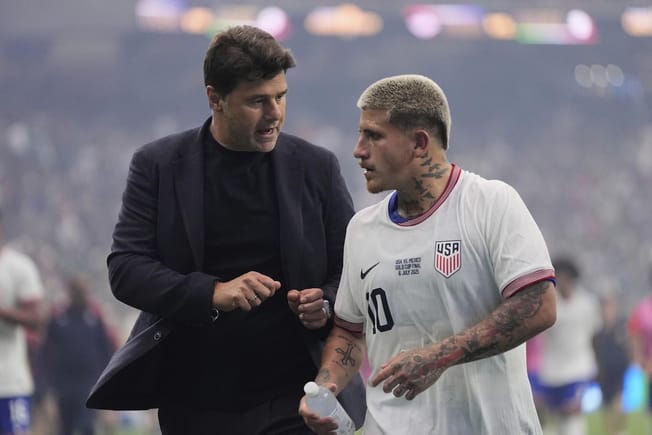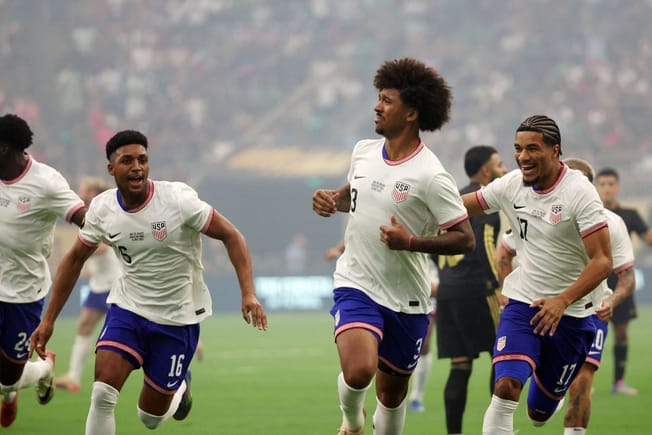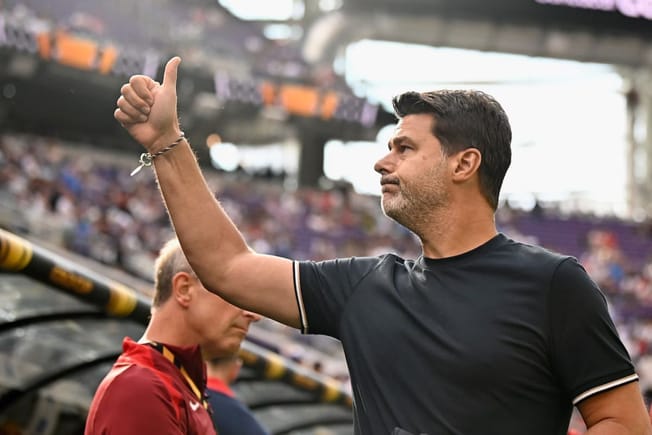Quick Hits
- Here at Backheeled, we called up a group of USMNT experts to help us all take stock of the team ahead of the World Cup
- We asked writers, analysts, and other experts from around the media landscape to asses the United States’ strengths, weaknesses, and more
What do you do when the World Cup is less than two weeks away and you want to learn more about the team ahead of the tournament? You call in the experts.
We asked six people who regularly cover the United States a handful of questions about the team, with topics ranging from breakout players, to strengths, to weaknesses, to next steps after the World Cup. Before we get to their answers, let’s introduce our group of experts.
THE EXPERTS
- Adam Belz, host, Scuffed Podcast
- Tom Bogert, insider, MLSsoccer
- Matt Doyle, writer, MLSsoccer
- Michele Giannone, sideline reporter, TUDN
- Joe Lowery, editor, Backheeled
- Taylor Rockwell, host, Total Soccer Show
Now that we’ve run through the people behind the answers, let’s get to the actual answers.
WHAT IS THE USMNT’S BIGGEST STRENGTH HEADING INTO THE WORLD CUP?
Tom Bogert: They don’t do it nearly enough, but I still think this team’s biggest asset is in transition. Christian Pulisic, Team Weah, and Gio Reyna are better in space, Adams is elite in defensive transition, and McKennie can be a killer as a late-arriving runner/winning duels when he’s on his game.
Joe Lowery: The combination of Matt Turner in goal and the team’s generally solid defensive structure. Under Gregg Berhalter, the U.S has done a pretty good job of limiting their opponents’ chances. Now we’ll see if that trend continues during the World Cup.
WHAT A SAVE FROM @headdturnerr FOR THE @USMNT 🧤🤯 pic.twitter.com/uoiLvttpBo
— FOX Soccer (@FOXSoccer) July 29, 2021
Matt Doyle: I genuinely think it’s the MMA (Musah-McKennie-Adams) midfield. None of those guys is a complete player, but their skillsets are almost perfectly complementary. As long as none of them get injured, which… yeah.
Taylor Rockwell: The familiarity of the MMA midfield. They’ve played enough games together to have a good awareness of each other, and who does what best. Luca de la Torre and Kellyn Acosta will know their assignments when they play, and I think that gives the U.S. a strong central core. Oh, and I can’t shake the feeling that Tim Weah will matter for the USMNT, and I think it makes them a lot better that he’s available.
Adam Belz: A strong midfield of Tyler Adams, Weston McKennie and Yunus Musah. They will give the U.S. a chance in most games.
Michele Giannone: The group. It’s a strong locker room. It doesn’t matter that it will be potentially the youngest roster in the tournament. The group is very united and that’s the reason why some players made the roster over others that, on paper, were maybe better quality-wise. Berhalter is a coach that highly values what a player brings into the locker room.
WHAT CONCERNS YOU MOST ABOUT THE USMNT HEADING INTO THE WORLD CUP?
Michele Giannone: First, the lack of high international competition. In this cycle, the team was stuck playing low-level Concacaf opposition for way too long. The Nations League, outside of the final four, was time wasted. That’s not the team’s fault obviously, but it’s still a negative. Second, it’s been system over players. Berhalter treats this national team way too much as a club. The player pool should dictate the system, not the other way around.
Matt Doyle: It’s still not clear what their best approach is. Or rather, it’s still not clear that Berhalter knows their best approach is to play against the ball a la both encounters with Mexico in qualifying. I’m worried we’re gonna try to be Spain and folks, we’re not Spain!
Adam Belz: The center backs. Long and McKenzie are too scary. Richards is injured. Tim Ream makes sense, but Berhalter didn’t call him up in the last camp before the World Cup. I assume we’ll see a Ream/Zimmerman pairing at CB, and that’s pretty decent, but I don’t know for sure that Berhalter will agree.
Taylor Rockwell: That I’m not sure I know any starters in the front three with certainty. I can make some strong guesses, but not being as certain has me nervous. We know the midfield. We know the most likely back four at this point, such as it is. But up top could be multiple different combinations based on form, fitness, chemistry, tactics, theoretical tactics, astrological symbols, etc. Some variety is good. Too much variety starts to feel like there isn’t a plan. The U.S. sometimes skirts that line pretty closely.
Tom Bogert: The insipid attack. Everything looked constipated over the last two friendlies. When things don’t go right for this group, it looks particularly bad. Health as well, given all the injury concerns that we know about, plus how often some players currently not injured have spent on the training table.
At least two weeks for Weston McKennie. Injury bug hitting #USMNT just ahead of World Cup https://t.co/TUA6MaUyey
— Paul Tenorio (@PaulTenorio) October 30, 2022
Joe Lowery: How injury prone the U.S.’s players are. Can the U.S. really count on Reyna for a full 90 minutes? What does the central midfield depth look like with multiple injury question marks there? And what about center back? I have some concerns about the U.S.’s tactical approach, but that’s dwarfed by my concerns about this team’s almost impressive ability to get injured.
WHAT IS THE U.S.’S KEY TO GETTING OUT OF THEIR GROUP?
Taylor Rockwell: Staying patient. I think Wales and Iran were always likely to sit deeper and make the U.S. beat them, but it doesn’t help that the secret seems to be out that the U.S. doesn’t have as many answers on the ball as it does when it’s playing on the break. Berhalter’s men will need to be calm in possession, move the ball quickly, and open up chances for themselves. If they start to panic or get anxious if nothing is happening right away, things could go poorly. In contrast, I think they will need to wait for the right moments against England, and not risk getting exposed to an attack that will be lightning quick if given the opportunity.
Adam Belz: No mistakes at the back and the U.S. needs to get its wingers 15-20 touches each in the opponent’s half. How that’s done is above my paygrade.
Michele Giannone: Rock solid on defense. Can’t fall behind against anyone at any time.
Joe Lowery: Defensive solidity is they key – and that doesn’t have to mean just defending in a low block and hoping for the best on the break. No, if the U.S. is compact in their high press in some moments and compact deeper down field in others, they’ll frustrate Wales, England, and Iran and create space for themselves in transition.
Matt Doyle: Set piece dominance (which is one of the reasons it drives me nuts that Jesus Ferreira’s the preferred No. 9, given that he doesn’t draw fouls and is a non-threat on restarts).
Tom Bogert: There’s the obvious – attack with more cohesion/pace, hope to stay fit, etc. — but a variance they *could* excel at is set pieces. The U.S. haven’t (really at all, except for a couple of games in the last few years), but they have the pieces. Walker Zimmerman is dominant in the air, so is McKennie. There is enough technical quality to produce better delivery. Set pieces go a long way in knockout tournaments.
WHICH U.S. PLAYER HAS THE MOST TO GAIN IN QATAR?
Matt Doyle: Whoever starts at the No. 9. Two goals from any of them turns them into a U.S. soccer legend, and probably gets them a move to a bigger club.
Taylor Rockwell: I think it’s probably Josh Sargent, which is something I wouldn’t have expected to be writing a few months ago. He went from high expectations (which were probably unfair) to some sustained criticism (a lot of which was fair), and now is back to being our once and future goalscorer. A big tournament with a couple goals makes him a name to watch for the rest of the season in the Championship, and helps push his career back towards where many expected it to be.
Adam Belz: Tim Weah. I think he’s widely viewed as a peripheral U.S. men’s national team player and he is not. He can cement himself as an elite player with a couple good performances and I think there’s a decent chance he will.
Tom Bogert: Usually you point to younger players. “This guy could play well and make a big transfer”. That’s true, but not nearly the phenomenon it used to be thanks to the globalization of the networks in this sport and technological advancements. Big clubs know about all these players and have all the game film and connections. So, for me, it’s Christian Pulisic. He’s already a star in this country. The biggest European clubs know how good he can be. A huge performance at the World Cup will do wonders for his starpower at home and will well-position him for the move away from Chelsea that he was pushing for in August.
BA opens the scoring in Cincy!!! pic.twitter.com/IivRaTp7B6
— U.S. Men's National Soccer Team (@USMNT) June 2, 2022
Joe Lowery: Yunus Musah. At just 19, he’s already a difference-maker for the U.S. on the ball. If he plays well in Qatar, he’ll have even more elite European clubs after him.
Michele Giannone: Pulisic. It’s been a nightmare-ish season at Chelsea and it feels like he gets blamed by everything and everyone when things go wrong. He needs to shut down the haters, and he can do it. He will do it.
YOU’RE TALKING TO A FRIEND OF YOURS WHO DOESN’T CARE ABOUT SOCCER. WHAT’S THE ONE THING YOU TELL THEM WHEN THEY ASK WHY THEY SHOULD CARE ABOUT THE USMNT AT THIS WORLD CUP?
Adam Belz: I have no good ideas. I care way more about the USMNT than most of my friends and family. Ideally we just talk about other stuff.
Joe Lowery: The USMNT is going to be the youngest team at the World Cup. And they could do some damage! Who doesn’t like stories of young, up-and-coming teams that go on to (maybe) do big things?
Tom Bogert: I don’t know, dudes pretend to care about bobsledding every four years at the Olympics. The World Cup is in another stratosphere. No explanation necessary. (But also, who doesn’t need a reason to go hangout with friends or have some beverages at 2pm in November for the biggest sporting event in the world?)
Matt Doyle: They shouldn’t lol
Taylor Rockwell: There isn’t a better sound in sports than when soccer fans erupt after a goal is scored. You don’t even have to be a sports fan to find tens of thousands of people all experiencing a moment of collective joy to be a pretty wonderful thing. And that’s not even counting the millions watching at home. It’s a sport that has literally made people stop shooting, such is its importance the world over. You can’t say that about many other things. Certainly not the biathlon.
Your #FIFAWorldCup 2026 Host Cities:
— FIFA World Cup (@FIFAWorldCup) June 16, 2022
🇺🇸Atlanta
🇺🇸Boston
🇺🇸Dallas
🇲🇽Guadalajara
🇺🇸Houston
🇺🇸Kansas City
🇺🇸Los Angeles
🇲🇽Mexico City
🇺🇸Miami
🇲🇽Monterrey
🇺🇸New York / New Jersey
🇺🇸Philadelphia
🇺🇸San Francisco Bay Area
🇺🇸Seattle
🇨🇦Toronto
🇨🇦Vancouver
Michele Giannone: The World Cup is coming to the United States in less than four years! Qatar is a major stepping stone for this group and will be them setting the tone and laying the groundwork for when this team gets to 2026 in their prime! And hey, they have to opportunity to potentially win it! Or at least they have the opportunity… to not suck.
AFTER THE WORLD CUP ENDS, WHAT SHOULD THE U.S.’S TOP PRIORITY BE AHEAD OF THE 2026 WORLD CUP?
Joe Lowery: I’m going to cheat here and give a two-part answer. After this World Cup, the U.S. should focus on finding the right manager to lead this team into the 2026 World Cup while also scheduling as many high-quality opponents as possible. This young group needs to be tested.
Adam Belz: Hiring a new coach, and then stewarding the player pool with 2026 in mind. Berhalter is an interesting young coach and he should go test himself in club soccer in Europe. It seems like he wants to. Hire somebody (not a simple choice) and then start testing fringe players with the national team, just open it up. Get Richie Ledezma in, and Alex Mendez, Auston Trusty, Josh Cohen, Haji Wright, Djordje Mihailovic, etc. Give them and others more chances to represent the country, and let’s keep building the game in America.
"I didn't hear what I wanted to hear, to be honest." 🙁
— USMNT Only (@usmntonly) October 2, 2022
Djordje Mihailovic on the conversations he had with Gregg Berhalter on his chances of going to the World Cup with the USMNT.
(via @TVASports) pic.twitter.com/DyovRHM5CM
Michele Giannone: Expand the player pool for the next two years. Musah, Pulisic, Adams, Reyna, etc. should not come to any game, at least for 2023. Face the Nations League and the Gold Cup with a fresh young group of players. Brandon Vazquez, Mihailovic and Eryk Williamson, anyone?
Tom Bogert: That depends on how the World Cup goes. Maybe there’s a coaching change. If so, that search becomes top priority. Beyond that, it’s trying to nurture this young core as best they can, which isn’t easy because they are with their clubs vastly more than the national team.
Taylor Rockwell: Conducting an objective evaluation of where the program is since Berhalter took over, and if it’s where they (with an eye towards 2026) expected it to be. A bad World Cup can unfairly tarnish the perception of a good coach, just as a surprise run can make a bad one seem good. It’s why Chelsea thought paying Roberto di Matteo a bunch of money would be a good idea. Remember that? Neither do they. So, I think the USSF will need to decide if our current trajectory moves us closer to winning a World Cup, or if things need to be changed while there’s still plenty of time. My gut says they keep Berhalter, and my assumption is that he’d want to stay.
Matt Doyle: Annexing France.







Comments